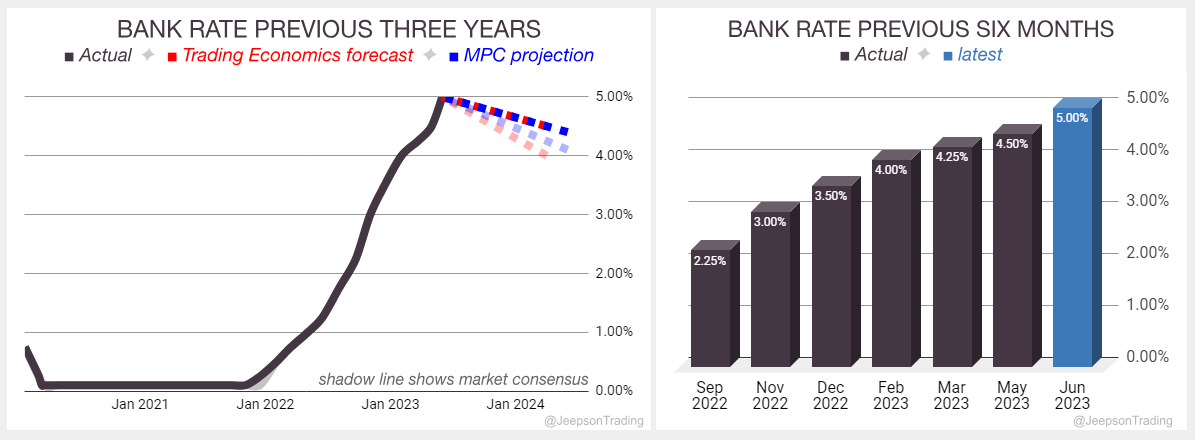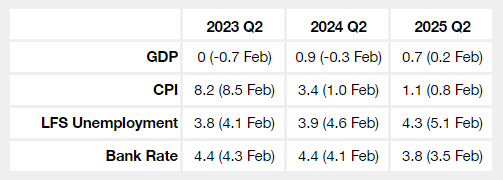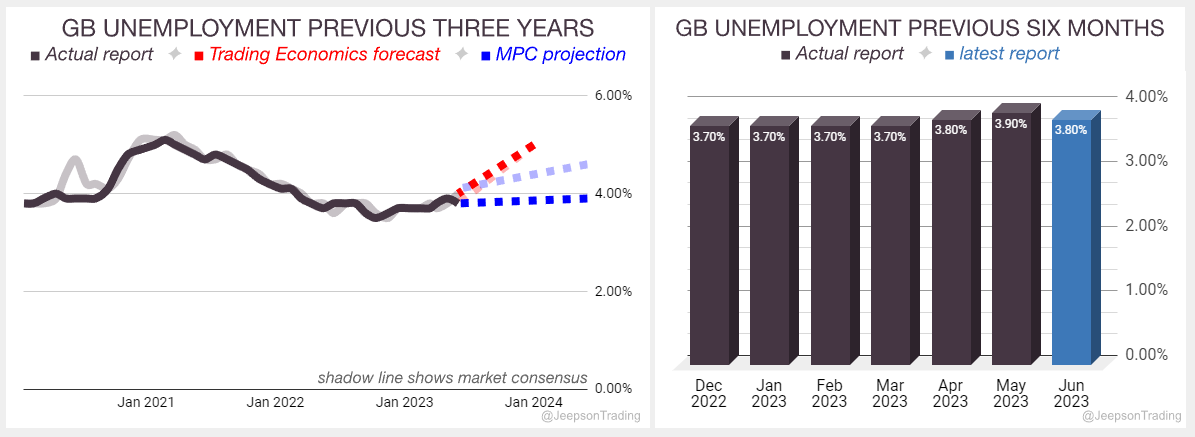Pound Sterling Forex Reference - JUNE (BoE Update)
DERBYSHIRE GB / JUNE 22nd, 2023 - Bank of England hikes 50bps due to high and sticky inflation. Next update after the final Q1 GDP report on Friday the 30th of June, or before if any significant event occurs.
This is the Pound Sterling Forex Reference and contains factual information that has been researched from official sources as well as market commentators. It is intended to be used as a guide to aid in your analysis.
ABOUT
The pound sterling, or GBP, is the official currency of the United Kingdom. It is the oldest currency in continuous use and is the fourth most traded currency in the world.
MONETARY POLICY
The Bank of England
The Bank of England is the Central Bank of the United Kingdom and monetary policy decisions are made by the nine members of the Monetary Policy Committee (MPC).
June Meeting of the Bank of England’s, Monetary Policy Committee (MPC)
The Bank Rate was hiked by 0.50% in June to 5.00%, higher than the 0.25% hike in May
This was higher than the 0.25% hike expected by analysts
This was the twelfth consecutive rate hike since the tightening cycle began in December 2021
The Monetary Policy Report (printed in May) projection for the Bank Rate in Q2 2023 was slightly raised to a peak of 4.4% from the 4.3% which was projected in February
Trading Economics have retained their Q2 2023 Bank Rate forecast at 4.75%
The next meeting is on Thursday the 3rd of August
The Monetary Policy Committee‘s statement contained cautiously optimistic sentiments and a forward-looking data-dependant approach to monetary policy:
7/9 voted to increase Bank Rate by 0.50 percentage points to 5.0%
Concerned about the persistence of inflationary pressures in the economy
Will monitor indications of persistent inflationary pressures and tighten further if required
Will adjust Bank Rate as necessary to return inflation to the 2% target sustainably in the medium term, in line with its remit.
Sources: The Bank of England, Trading Economics, FXStreet
May 2023 Monetary Policy Report
The Bank of England's Monetary Policy Committee (MPC) revised its economic forecast for the UK at their May meeting. They will update them again in August.
Increased the Bank Rate by 0.25 percentage points, to 4.5%
Expects CPI inflation to fall sharply from April, but to remain above the 2% target in the medium term
Continuing to address the risk of more persistent strength in domestic price and wage setting
Continuing to closely monitor indications of persistent inflationary pressures
Will adjust Bank Rate as necessary to return inflation to the 2% target sustainably in the medium term
Inflation has been rising sharply in recent months, driven by
the war in Ukraine
rising energy prices
supply chain disruptions
The MPC is concerned that inflation could become entrenched if it is not brought under control
The raising of the Bank Rate is to slow the pace of economic growth and bring inflation back down to the 2% target
ECONOMIC DATA
Gross Domestic Product (GDP)
Measures the quarter on quarter change of the inflation-adjusted value of produced goods and services.
GDP Growth Rate Preliminary Estimate for Q1 2023
GDP in the UK for Q1 remained steady at a 0.1% quarterly expansion from 0.1% in Q4 2022
This also matched the 0.1% expansion expected by analysts
Driven by construction and manufacturing. Services and household consumption were flat
The May Monetary Policy Report projection for the Q2 2023 Real GDP was significantly raised to 0.00% growth from a contraction of -0.7% which was projected in February
Trading Economics have raised their Q2 2023 growth forecast to 0.3% from 0.2%
The final Q1 report is due on Friday the 30th of June
Sources: Office for National Statistics, Trading Economics, FXStreet
CONSUMER PRICE INDEX
Measures the yearly change in the price of goods and services purchased by consumers.
CPI Report for May
CPI in the UK for May remained at 8.7% annual inflation from 8.7% in April
This was a lot higher than the 8.4% expected by analysts
Inflation driven by rising prices for air travel, recreational and cultural goods and services, and second-hand cars. Core CPI is 7.1%, a new 30-year high
The May Monetary Policy Report projection for the Q2 2023 CPI was lowered to 8.2% inflation from 8.5% inflation which was projected in February
Trading Economics have lowered their Q2 2023 CPI forecast to 7.5% from 8.0%
The June report is due on Wednesday the 19th of July
Sources: Office for National Statistics, Trading Economics, FXStreet
LABOUR
Unemployment rate measures the number of people actively looking for a job as a percentage of the labour force.
Labour Report for April
Unemployment in the UK for April fell slightly to 3.8% from 3.9% in March
Lower than the 4.0% expected by analysts
Employment improved to 76% from 75.8%
The May Monetary Policy Report projection for Q2 2023 unemployment was lowered to 3.8% from 4.1% which was projected in February
Trading Economics have retained their Q2 2023 unemployment rate forecast at 4.0%
The May report is due on Tuesday the 11th of July
Sources: Office for National Statistics, Trading Economics, FXStreet
MARKET NARRATIVES
Cost-of-Living Crisis
The cost-of-living crisis has reduced the spending power of consumers and resulted in slower economic growth. This is likely to lead to reduced foreign investment in the stock market and is expected to apply downward pressure on the pound’s value.
Since late 2021, the prices of essential goods have been rising faster than incomes. This has caused a fall in real income which means people now have less money to buy the things they need.
There are a number of factors that have contributed to this rise in prices, including inflation, the COVID-19 pandemic, Russia's invasion of Ukraine, and Brexit.
2023: Strikes continue and further sectors join in such as education.
2022: Government assistance provided with energy bill cap and a minimum wage increase fails to solve the crisis and employees strike from several sectors such as transport, health and services. Some strikes are resolved but the majority are ongoing.
GEOPOLITICAL EVENTS
Russian Invasion of Ukraine
The war is having a detrimental effect on the global and UK economy by causing higher energy prices, supply chain disruptions, financial market volatility, refugee crisis and geopolitical uncertainty.
2021: 92,000 Russian troops are amassed at the Ukraine border and President Putin proposes a prohibition of Ukraine joining NATO which is rejected.
2022: On the 21st of February, President Putin ordered Russian forces to enter the separatist republics in eastern Ukraine and announced recognition of the two pro-Russian breakaway regions (Donetsk People's Republic and Luhansk People's Republic). NATO applied sanctions and scaled them up as the war progressed. Ukraine mounted a counter-offensive which regained lost territory and as winter arrived, a stalemate began.
2023: Russian began a new offensive in January although gained little ground. In early June, Ukraine began its counteroffensive.
Brexit
The UK's decision to leave the European Union (EU) has created a great deal of uncertainty about the future of the UK economy. This uncertainty has made investors less willing to take risks, which has led to a sell-off in risky assets, such as stocks and currencies.
2014-2015: The euro-sceptic party UKIP garners support and scores the most seats in the EU parliament election. The Conservatives win the 2015 general election and as promised in the manifesto, PM Cameron arranges a referendum on the UK's membership of the EU.
2016: On the 23rd of June, 52% voted for the UK to leave the EU. PM Cameron who is pro-EU resigns and Theresa May takes the helm. In October, Article 50 is triggered and the two-year process of the UK's withdrawal from the EU begins.
2017-2018: PM May calls a snap general election and loses the majority but retains power by sharing with the Democratic Unionist Party (DUP). Withdrawal agreements fail to pass parliament, an extension is made but further revisions to the agreement continue to be rejected by parliament.
2019: PM May resigns and Boris Johnson takes power who gains another extension from the EU to enable further negotiations. The deadline is now the 31st of January, 2020. Another general election is called and the Conservatives regain the majority.
2020: With negotiations strained and the deadline having passed, the UK is forced to leave the EU without a deal. Negotiations continue and a deal is eventually agreed which comes into effect on the 1st of January 2021. The EU-UK Trade and Cooperation Agreement (TCA) is a comprehensive trade deal that covers goods, services, fisheries, and much more.
Gavin Pearson
Retail trader since 2008
Specialises in forex G7 currencies
Funded account from the5ers.com
Member of the eToro Popular Investors Program
Regular contributor to FXStreet.com analysis and education pages
Jeepson Trading Fund
Returned 27% in 2022 and 8.6% in 2023 Q1
Forex focused
Copy Trading available at eToro
eToro
eToro is a social trading platform
Users can copy trades by clicking the "Copy" button on the profile page
Disclaimer
Past performance is not indicative of future results
Trading involves risk, and you could lose money
-end-







